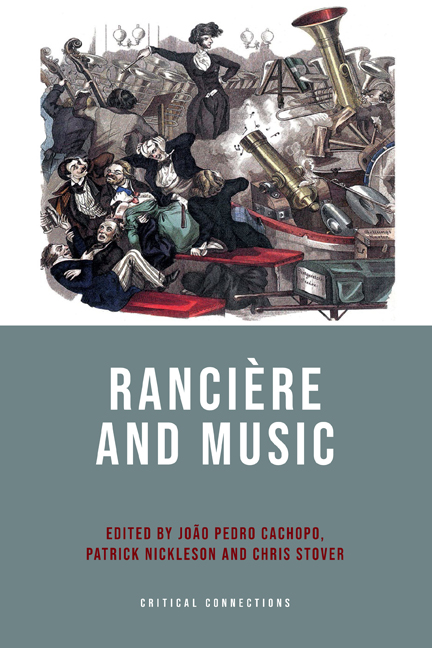Book contents
- Frontmatter
- Contents
- List of Examples
- Acknowledgements
- Notes on Contributors
- Introduction
- Part I: Music and Noise
- 1 Musique concrète and the Aesthetic Regime of Art
- 2 ‘Rip it up and start again’: Reconfigurations of the Audible under the Aesthetic Regime of the Arts
- 3 A Lesson in Low Music
- Part II: Politics of History
- 4 Wandering with Rancière: Sound and Structure under the Aesthetic Regime
- 5 Staging Music in the Aesthetic Regime of Art: Rancière, Berlioz and the Bells of Harold en Italie
- 6 Rancière on Music, Rancière’s Non-music
- 7 Coloured Opera and the Violence of Dis-identification
- Part III: Politics of Interaction
- 8 Musical Politics in the Cuban Police Order
- 9 Rancière and Improvisation: Reading Contingency in Music and Politics
- 10 Rancière’s Affective Impropriety
- Part IV: Encounters and Challenges
- 11 Rancière, Resistance and the Problem of Commemorative Art: Music Displacing Violence Displacing Music
- 12 Stain
- 13 On Shoemakers and Related Matters: Rancière and Badiou on Richard Wagner
- 14 Roll Over the Musical Boundaries: A Few Milestones for the Implementation of an Equal Method in Musicology
- Afterword
- A Distant Sound
- Works Cited
- Index
Introduction
Published online by Cambridge University Press: 03 October 2020
- Frontmatter
- Contents
- List of Examples
- Acknowledgements
- Notes on Contributors
- Introduction
- Part I: Music and Noise
- 1 Musique concrète and the Aesthetic Regime of Art
- 2 ‘Rip it up and start again’: Reconfigurations of the Audible under the Aesthetic Regime of the Arts
- 3 A Lesson in Low Music
- Part II: Politics of History
- 4 Wandering with Rancière: Sound and Structure under the Aesthetic Regime
- 5 Staging Music in the Aesthetic Regime of Art: Rancière, Berlioz and the Bells of Harold en Italie
- 6 Rancière on Music, Rancière’s Non-music
- 7 Coloured Opera and the Violence of Dis-identification
- Part III: Politics of Interaction
- 8 Musical Politics in the Cuban Police Order
- 9 Rancière and Improvisation: Reading Contingency in Music and Politics
- 10 Rancière’s Affective Impropriety
- Part IV: Encounters and Challenges
- 11 Rancière, Resistance and the Problem of Commemorative Art: Music Displacing Violence Displacing Music
- 12 Stain
- 13 On Shoemakers and Related Matters: Rancière and Badiou on Richard Wagner
- 14 Roll Over the Musical Boundaries: A Few Milestones for the Implementation of an Equal Method in Musicology
- Afterword
- A Distant Sound
- Works Cited
- Index
Summary
What new problematics does a turn to music animate in Rancière’s political-aesthetic thought? What existing problematics can be newly attended to, and what new deployments can be imagined? What musicalities are revealed in his thought and writings by such a turn? What, in short, is the role of music, of the musical, of musicking for Rancière, either explicitly or implicitly? And backing up slightly, what is the role of sound? Is sound the medium in which the art of the muses is inextricably embedded? Or can music reach beyond the sonic sphere in the course of its various metamorphoses? Music is overtly present in Rancière's writing only very rarely; indeed, it has become a truism that Rancière does not have much to say about music. But music is often tacitly – mutely – present in his thought, and we can see how it rises to the surface as a point of intersection and resonance between the arts, through or as musicality.
Rancière's multifaceted enquiry into the relationship between aesthetics and politics offers many new prospects for musical insight, research and practice, as the chapters that comprise this volume will demonstrate. Conversely, music offers a rich terrain – a rich scenographic field1 – for continuing to develop Rancière’s political/aesthetic thought. Music's essentially temporal, relational status, its modes of expressing and engendering (often non- or paralinguistic) meaning, the lines it draws between philosophical and political (in conventional usage) expression, the ontological and epistemological questions it continues to raise: all of these are fertile ground both for engagement via Rancièrean conceptual apparatuses and for developing, refining and transforming those apparatuses. Some of these themes reflect why music has been philosophically valuable for so many canonical philosophers, an abbreviated list of whom must include Rousseau, Schiller, Schopenhauer, Hegel, Nietzsche, Bergson, Husserl, Adorno, Bloch, Langer, Jankélévitch, and Deleuze and Guattari. Because music's particular mode of temporal extension does not break down into basic syntactic units in any fully agreed-upon way, it provides a valuable illustration of an irreducible temporality that extends to other modes of existence. Likewise with music’s fundamental relationality: sounds acquire meaning through their interactions with other sounds, words and images, and listeners interact with those sound-constellations in ways that both express and challenge the historical and sociocultural contexts in which they find themselves.
- Type
- Chapter
- Information
- Ranciere and Music , pp. 1 - 24Publisher: Edinburgh University PressPrint publication year: 2020

